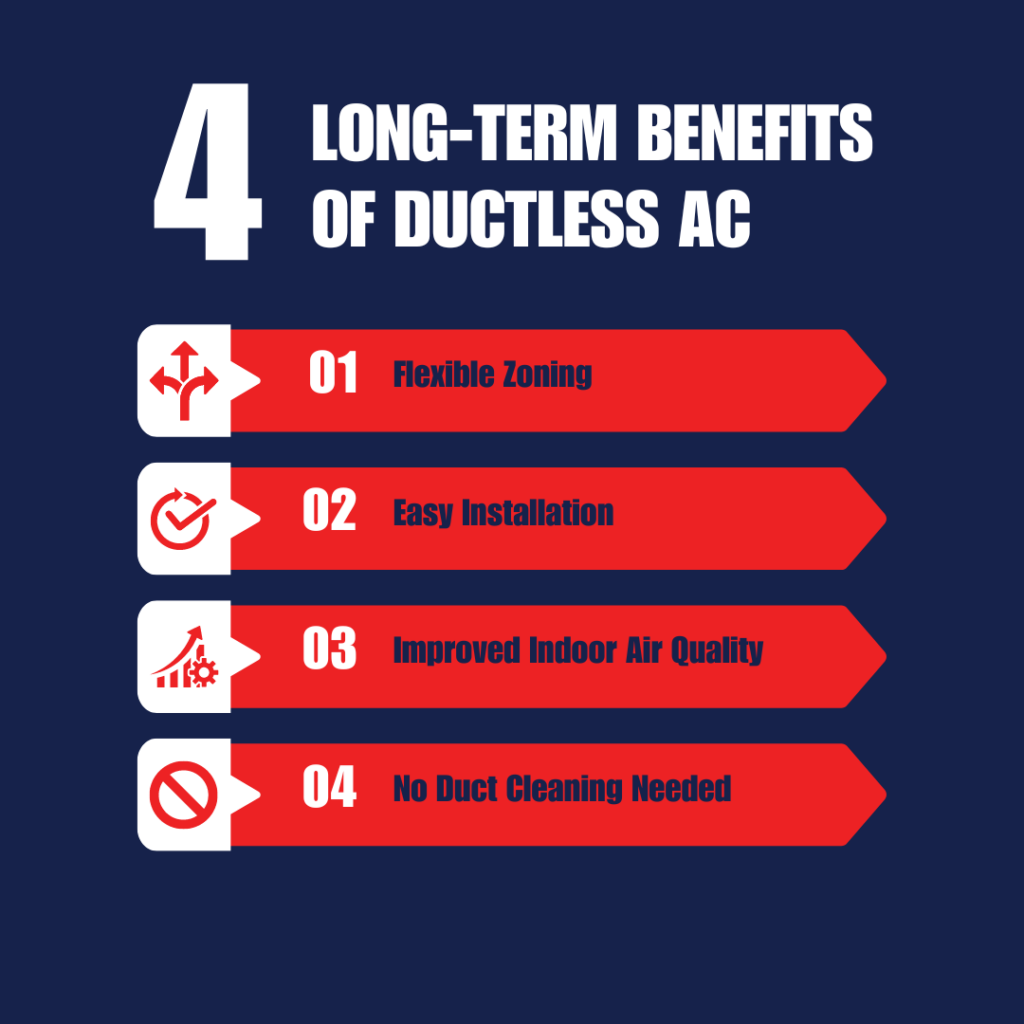Is Ductless AC Quieter Than Traditional Systems?
When it comes to creating a peaceful home environment, noise can be an unwelcome guest. Everyday noises are just part of life but can become overwhelming when you’re trying to relax or sleep, dampening your level of comfort. One often-overlooked source of potential noise is the air conditioning system running in the background, which can contribute to the overall noise levels in your home.
When considering air conditioners for your home, you may be deciding between central air systems and ductless systems. That being said, ductless mini-split systems stand out as a superior choice for homeowners seeking an efficient and tranquil heating and cooling solution. One of their most significant advantages is the remarkably low noise output they generate resulting in quieter operation. This quiet performance ensures that homeowners can enjoy a serene environment without the intrusive humming, banging, or whirring noises commonly associated with traditional ducted systems. Read through our guide below to understand the differences between ductless and traditional AC systems, including which is quieter.
What Is A Ductless AC System?
A ductless AC system operates quite differently from traditional air conditioning units, providing a unique solution for cooling spaces without the need for extensive ductwork. Unlike central air systems that rely on a series of ducts to distribute cooled air throughout a home, ductless systems are comprised of one or more indoor air-handling units paired with an outdoor unit known as a compressor. These components are connected through a conduit that contains essential elements such as power cables, refrigerant tubing, suction tubing, and a condensate drain. This streamlined design allows ductless systems to deliver focused cooling to specific zones within your home, making them an efficient choice for targeted climate control.
Ductless vs. Traditional: Which Is Quieter?
When choosing your AC system, you may be wondering if ductless systems are quieter than traditional AC. The short answer is yes, ductless AC is quieter than a traditional system!
In addition to their minimal sound impact, ductless mini-split systems are strategically designed to mitigate any external noise disturbances resulting in quiet operation. The separation between the indoor units and outdoor units means that homeowners can relish in comfortable indoor temperatures without being distracted by the rumbling vibrations generated by outdoor compressors. Coupled with energy efficiency and precise temperature control, these systems effectively meet diverse climate needs while remaining unobtrusive in domestic settings. For those looking for reliable, cost-effective solutions that blend comfort with silent operation, ductless mini-split AC systems offer an optimal answer for modern homes where serenity is key.

Long-Term Benefits Of Ductless AC
Ductless air conditioning systems offer significant advantages in terms of energy efficiency compared to traditional central air conditioning systems. One of the most compelling benefits is their inherent design, which eliminates the need for ductwork. This absence of ducts not only simplifies installation but also prevents energy losses that often occur due to leaky or inadequately insulated ducts. According to the U.S. Department of Energy, these duct losses can account for more than 30% of total energy consumption for air conditioning systems. Some other benefits include:
- Flexible Zoning: Each indoor unit can be controlled independently, allowing you to cool specific rooms or areas as needed. This provides personalized comfort and can reduce energy usage.
- Easy Installation: Ductless systems are easier and quicker to install since they don’t require ductwork. This makes them a great option for older homes or additions where installing ducts would be difficult or expensive.
- Improved Indoor Air Quality: Without ducts, there is less chance of dust, allergens, and contaminants being circulated throughout the home. Many ductless systems also come with advanced filtration options.
- No Duct Cleaning Needed: Since there are no ducts, you eliminate the need for regular duct cleaning, reducing maintenance costs and hassle.
Ductless AC: The Downsides
While ductless AC is great for homeowners looking to heat or cool their home in a quiet and efficient manner, that doesn’t mean there are not any drawbacks. While the systems work very well in comparison to central air, some cons may include cost, appearance, maintenance, space, and more!
High Upfront Cost
Split air conditioning systems often have a higher initial investment and installation cost compared to conventional systems.
Professional Installation Required
The installation process of a ductless system usually requires a qualified technician to offer proper installation services, adding to the overall expense.
Aesthetic Appeal
The indoor units are wall-mounted and visible, which may not blend well with certain home designs or decor preferences.
Ongoing Maintenance
While generally low-maintenance, any malfunctions or regular servicing typically require a technician familiar with the specific model, leading to potential long-term commitments, compared to the regular maintenance of central air conditioners which is often less of a commitment.
Limited Accessibility for Budget-Conscious Buyers
The higher initial cost can make ductless systems less accessible for those on a tighter budget or seeking immediate financial relief.
Overall, for those homeowners looking for quiet operation when it comes to their home’s AC, then a ductless mini-split can be a great choice! Between lower sound levels around your home, reduced energy bills, precise temperature control, and more, the energy efficient systems come with plenty of benefits. If you need any help with your AC system or are interested in energy savings, ways to lower your utility bills, air filters, and more, reach out to us today! Our certified technicians are always happy to help!
